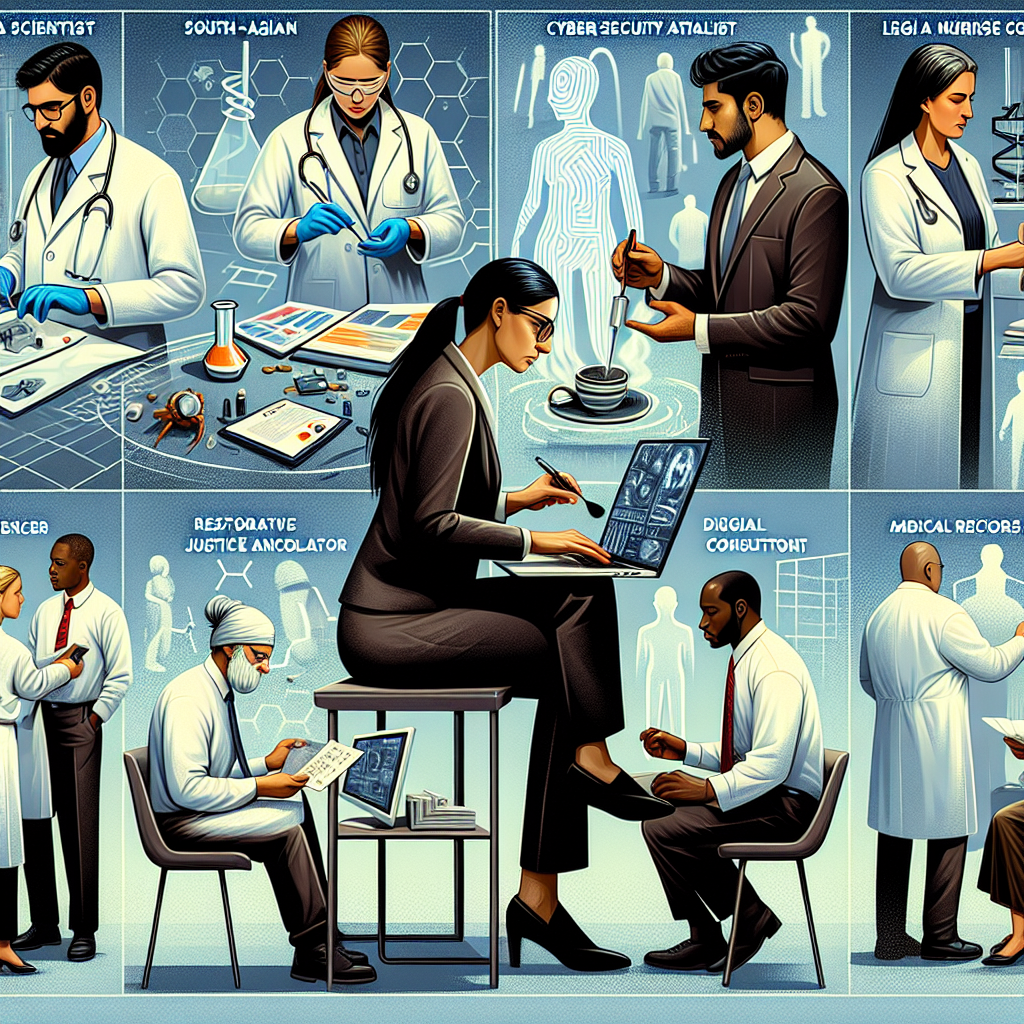Jobs With Ciminal Justice Degree. Moreover, the criminal justice landscape is constantly evolving, adapting to new challenges and innovations. This dynamism not only makes for an engaging career but also ensures that professionals are always learning and growing. By understanding the breadth and depth of opportunities within criminal justice, individuals can find roles that are both personally fulfilling and socially significant.
Understanding the Scope of Criminal Justice Careers

The criminal justice system is complex and multi-faceted, encompassing law enforcement, the courts, and corrections. Each sector provides numerous job opportunities for those equipped with a criminal justice degree. Understanding the interplay between these components is crucial for anyone looking to make a meaningful impact.
Beyond the traditional roles, there are also emerging fields within criminal justice that address contemporary issues such as cybercrime, terrorism, and human trafficking. These areas require specialized knowledge and skills, offering new avenues for career development. As such, a criminal justice degree can serve as a versatile foundation, opening doors to both established and emerging roles in the field.
Law Enforcement Careers
Law enforcement is one of the most recognizable paths for criminal justice graduates. This sector is dedicated to maintaining public order and safety, enforcing the law, and preventing, detecting, and investigating criminal activities. It offers a wide range of roles from uniformed police officers to specialized units dealing with narcotics, cybercrime, or community outreach.
In addition to traditional policing roles, law enforcement careers can also involve working with federal agencies like the FBI or DEA, each with unique responsibilities and challenges. These roles often require additional training and specialization, providing opportunities for growth and advancement. The dynamic nature of law enforcement ensures that no two days are the same, making it an exciting career choice for those passionate about justice and community service.
Police Officers
Police officers are the frontline defenders of public safety. They work in communities to maintain law and order, respond to emergencies, and provide assistance to citizens. A criminal justice degree can provide a strong foundation for this career, teaching critical skills such as communication, problem-solving, and ethical decision-making.
Beyond these foundational skills, police officers often engage with diverse communities, requiring cultural sensitivity and adaptability. Their role is not just about enforcing laws but also about building trust and relationships within the community. This aspect of the job is vital for effective policing and contributes to a safer, more cohesive society.
Detectives and Criminal Investigators
For those who enjoy solving puzzles and have a keen eye for detail, becoming a detective or criminal investigator might be the perfect fit. These professionals gather facts and collect evidence for criminal cases. They often specialize in specific types of crimes such as homicide or fraud. This specialization allows detectives to develop deep expertise in their chosen area, contributing to more effective investigations and successful case resolutions.
In addition to technical skills, detectives must possess strong analytical and interpersonal skills. They frequently interact with victims, witnesses, and suspects, requiring a balanced approach of empathy and objectivity. Their work is instrumental in ensuring justice is served, making it a deeply rewarding career path.
Legal and Court System Careers
The legal system offers a range of career options for criminal justice graduates. These roles focus on upholding the law within courtroom settings and legal practices. From supporting attorneys to managing courtroom logistics, these positions are crucial for the smooth functioning of the judicial process.
Legal careers also offer opportunities for specialization, whether in criminal law, family law, or corporate law. Each area presents its own set of challenges and rewards, allowing individuals to tailor their careers to their interests and strengths. With a strong foundation in legal principles and procedures, criminal justice graduates are well-equipped to excel in these roles.
Paralegals and Legal Assistants
Paralegals and legal assistants support lawyers by conducting research, organizing files, and drafting documents. This role is crucial in helping attorneys prepare for trials and hearings. A criminal justice degree provides a solid background in the legal system, making it an excellent starting point for a career as a paralegal.
In addition to administrative tasks, paralegals often play a key role in case strategy and analysis. They must have a strong understanding of legal terminology and procedures, as well as excellent research skills. This position offers a unique opportunity to be involved in the legal process and contribute to the success of legal cases.
Court Clerks
Court clerks have a pivotal role in the judicial system. They manage administrative tasks in the courtroom, such as maintaining records, scheduling hearings, and managing case documents. This job demands organizational skills and attention to detail, qualities that are nurtured within a criminal justice program.
Beyond these core responsibilities, court clerks often serve as the liaison between judges, attorneys, and the public. They ensure that court proceedings run smoothly and efficiently, contributing to the overall effectiveness of the legal system. For those interested in the inner workings of the judicial process, a career as a court clerk offers both stability and a front-row seat to the legal proceedings.
Corrections and Rehabilitation Careers
The corrections sector is vital for the rehabilitation and reintegration of offenders. Careers here focus on managing and supervising individuals who have been arrested or convicted of crimes. The goal is not only to ensure security but also to provide opportunities for rehabilitation and personal growth.
Corrections careers require a deep understanding of human behavior and the factors that contribute to criminal activity. Professionals in this field work to address these underlying issues, promoting positive change and reducing the likelihood of reoffense. This aspect of the job is crucial for fostering safer communities and supporting individuals in their journey toward rehabilitation.
Probation and Parole Officers
Probation and parole officers work with offenders to ensure they meet the conditions of their probation or parole. They help integrate individuals back into society by providing guidance and resources. This role is essential for reducing recidivism and supporting community safety.
In addition to monitoring compliance, probation and parole officers often act as mentors and advocates for their clients. They work closely with community organizations and service providers to connect individuals with the support they need. This holistic approach is key to successful reintegration and long-term success.
Correctional Officers
Correctional officers oversee individuals who are incarcerated in jails or prisons. They maintain security and order within the facility and ensure the well-being of inmates. A career in corrections requires strong interpersonal skills and the ability to handle high-pressure situations.
In addition to maintaining safety, correctional officers often play a role in rehabilitation programs and inmate education. They have the opportunity to positively impact the lives of those in their care, contributing to a safer and more just society. This dual focus on security and rehabilitation makes for a challenging yet rewarding career.
Emerging Careers in Criminal Justice

The field of criminal justice is continually evolving, with new roles emerging in response to societal changes and technological advancements. These emerging careers address contemporary issues and require innovative solutions, offering exciting opportunities for those entering the field.
As society becomes more interconnected and technology-driven, the demand for professionals who can navigate these complexities continues to grow Jobs With Ciminal Justice Degree. Criminal justice graduates are well-positioned to meet these challenges, leveraging their skills and knowledge to make a meaningful impact in these emerging areas.
Cybercrime Specialists
As technology becomes more integral to our lives, cybercrime is on the rise. Cybercrime specialists investigate crimes such as hacking, identity theft, and online fraud. A criminal justice degree can be enhanced with courses in computer science or cybersecurity to prepare for this cutting-edge field.
The role of a cybercrime specialist is crucial in safeguarding sensitive information and protecting individuals and organizations from digital threats. These professionals must stay abreast of the latest technologies and tactics used by cybercriminals, ensuring they are always one step ahead. This field offers a dynamic and challenging environment for those interested in technology and justice.
Forensic Science Technicians
Forensic science technicians work in labs and on crime scenes to collect and analyze physical evidence. This role combines science with criminal justice, requiring a detail-oriented mindset and a passion for discovery. They play a vital role in solving crimes and ensuring justice is served by providing critical evidence for investigations and trials.
Beyond traditional forensic roles, there are opportunities to specialize in areas such as DNA analysis, toxicology, or digital forensics. Each specialization requires its own set of skills and knowledge, offering diverse career paths within the forensic field. For those with a keen interest in science and a desire to contribute to the criminal justice system, a career as a forensic science technician is both rewarding and impactful.
Educational Pathways and Skill Development
A strong educational foundation is essential for success in any criminal justice career Jobs With Ciminal Justice Degree. A criminal justice degree typically covers a broad range of subjects including criminology, sociology, psychology, and the legal system. This multidisciplinary approach equips students with a comprehensive understanding of the criminal justice system.
In addition to traditional coursework, many programs offer experiential learning opportunities such as internships, fieldwork, and simulations. These experiences allow students to apply their knowledge in real-world settings, gaining valuable insights and building professional networks. This practical approach to education is crucial for developing the skills needed to thrive in the field.
Building a Strong Educational Foundation
A criminal justice degree typically covers a broad range of subjects including criminology, sociology, psychology, and the legal system. This multidisciplinary approach equips students with a comprehensive understanding of the criminal justice system. It provides the theoretical foundation necessary to understand complex issues and develop effective solutions.
Beyond the classroom, many programs incorporate experiential learning opportunities. Internships, field placements Jobs With Ciminal Justice Degree. and service-learning projects allow students to apply their knowledge in real-world contexts. These experiences are invaluable for building the practical skills and professional networks needed to succeed in the field.
Developing Essential Skills
In addition to academic knowledge, students gain critical skills such as analytical thinking, ethical reasoning, and communication. These skills are essential for success in any criminal justice career. They enable professionals to navigate complex situations, make informed decisions, and effectively engage with diverse populations.
Moreover, the development of these skills often continues beyond formal education. Many criminal justice roles require ongoing professional development and training to stay current with new laws, technologies, and best practices. This commitment to lifelong learning is a hallmark of successful professionals in the field.
Career Advancement and Professional Growth

The criminal justice field offers numerous opportunities for career advancement and professional growth. By pursuing further education, gaining specialized skills, and building professional networks, individuals can enhance their expertise and advance their careers.
Whether through formal education, professional certifications, or involvement in industry organizations, there are many avenues for development. These opportunities not only contribute to personal growth but also enhance the effectiveness and impact of the work being done in the field.
Continuing Education
The criminal justice field values continuous learning. Many professionals pursue advanced degrees or specialized certifications to enhance their expertise and advance their careers. Opportunities for further education include master’s programs in criminal justice, law school, or specialized training in areas like forensic science or cybersecurity.
Continuing education also provides opportunities to explore new interests and expand one’s skill set. Whether pursuing a new specialization or deepening existing expertise, ongoing learning is key to staying competitive in the field. This commitment to professional development not only benefits individuals but also contributes to the overall advancement of the criminal justice system.
Networking and Professional Organizations
Joining professional organizations such as the American Criminal Justice Association or the National Association of Legal Assistants can provide networking opportunities and resources for career development. These organizations often offer conferences, workshops, and seminars to help professionals stay current with industry trends.
In addition to formal events, professional organizations provide forums for collaboration and knowledge sharing. Members can connect with peers, exchange ideas, and collaborate on research or advocacy initiatives. These connections are invaluable for career advancement and contribute to the growth and innovation of the field as a whole.
Jobs With Ciminal Justice Degree
Jobs With Ciminal Justice Degree. A criminal justice degree is more than just a path to a job; it’s an opportunity to make a difference. Whether you’re drawn to law enforcement, the legal system, or corrections, this field offers diverse career options that can align with your interests and skills. By pursuing a career in criminal justice, you can contribute to the safety and justice of your community.
The impact of criminal justice professionals extends beyond individual cases; it shapes the broader societal landscape. By addressing issues of crime, justice, and rehabilitation, these professionals play a critical role in fostering a more equitable and safe society. Embark on your journey today and explore the rewarding paths a criminal justice degree has to offer.




